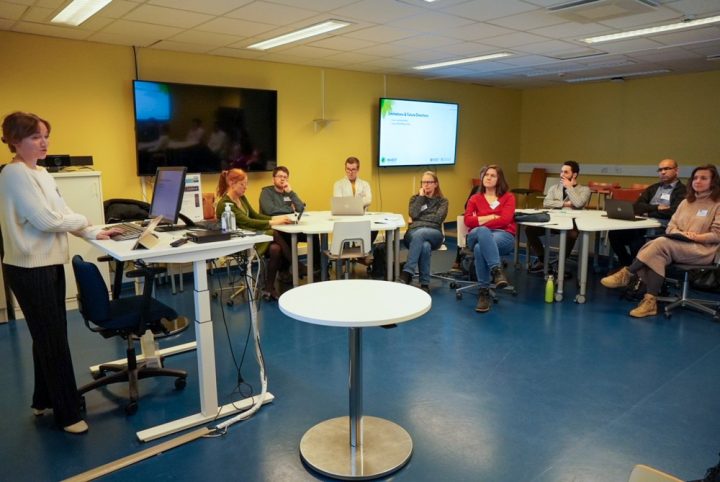Scientific Seminar grew to be ready for an international conference
Research on children, families and youth was highlighted at INVEST’s ninth Scientific Seminar. It was also a historic occasion. Previous Scientific Seminars been internal to INVEST members, the next one will be open and international.
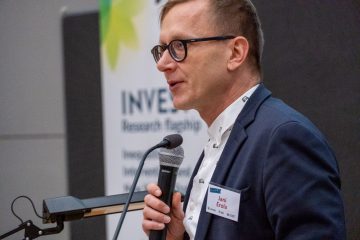 Already in the opening words of the Scientific Seminar, Invest Director Jani Erola was looking to the future. Ongoing Scientific Seminar was the ninth in a row, and all so far have been internal to Invest members. Next, 10th Scientific Seminar will be organised as an international conference on 16–17 May. Day before there will be pre conference.
Already in the opening words of the Scientific Seminar, Invest Director Jani Erola was looking to the future. Ongoing Scientific Seminar was the ninth in a row, and all so far have been internal to Invest members. Next, 10th Scientific Seminar will be organised as an international conference on 16–17 May. Day before there will be pre conference.
– The theme of event is Digitalization, social inequality and behavioural change. The submission of papers opens on Wednesday, Erola encouraged.
The keynote of the event was given by associate professor Kirsi Peltonen with title Mental Health of War Exposed Children – Evidence Base for Actions. Her recent research concentrates on the welfare of children on children fleeing Ukraine. The conflict has raised awareness in schools, for example, of how children fleeing traumatic situations need special support.
According to Peltonen, knowledge about how to help children traumatised by war is not widespread.
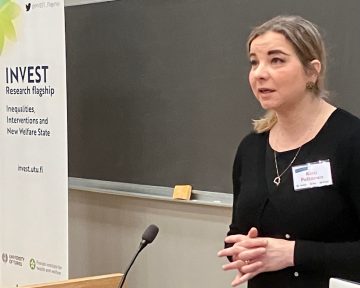 – It is important that we provide evidence based interventions for traumatised children. Public health communication channels should engage with the treatment of children exposed to war in the same way that, for example, new cancer treatments are communicated, Peltonen said.
– It is important that we provide evidence based interventions for traumatised children. Public health communication channels should engage with the treatment of children exposed to war in the same way that, for example, new cancer treatments are communicated, Peltonen said.
In her speech she pointed about, that the methods to enhance parenting overall may be used with traumatiesed families, but they need to be tailored to the situation with parent him- or herself is traumatised.
The war in Ukraine has prompted kindergartens, schools and health professionals to think about supporting children from other conflict zones. Peltonen quoted Rule of Law in Armed Conflict Online Portal, which classifies all situations of armed violence that amount to an armed conflict under international humanitarian law.
– Today, it monitors more than 110 armed conflicts and provides information about parties, the latest developments, and applicable international law, Peltonen said.
Seminar inspires thinking outside the box
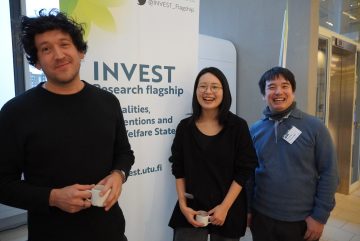 The Scientific Seminar is also a place to meet colleagues. Héctor Bahamonde (left in the picture), Yuko Mori and Takuya Yanagida, all from different disciplines, met each other during the coffee break. Their thoughts came back to the presentations they had just heard in parallel sessions.
The Scientific Seminar is also a place to meet colleagues. Héctor Bahamonde (left in the picture), Yuko Mori and Takuya Yanagida, all from different disciplines, met each other during the coffee break. Their thoughts came back to the presentations they had just heard in parallel sessions.
The topics of presentations show the variety: there were for example sessions with topics Does empathy lead to bullying?; Genetic risk for mental health disorders; Workplace characteristics and father family leave, Ethnic Differences in Leaving Home; Causal inference for panel data with dynamic multivariate panel models; The Geography of Sibling Similarity in Education; Nurturance, eroticism, and relationship satisfaction in diverse relationship forms. 28 sessions in total.
– The specificity of Science Seminars is interdisciplinary. Where else we would go in the same event to hear sociology, political science, child psychiatry in the same session, Yanagida said.
– This helps us think outside of the box, Héctor Bahamonde added.
Yuko Mori pointed out that Scientific Seminar is not important only as a place to hear about research projects but also a place to personal development.
– Here I can discuss with colleagues how we develop as a researcher, and we can support each other, Yuko Mori said.
Mori also chaired Health and Biology session and gave a presentation with title Unmet need for mental health care among adolescents in Asia and Europe.
Discussions also help the researcher to move forward in his or her work. Doctoral researcher Simo Arhippainen gave presentation with the title The gene-environmental interplay of mental health, cognitive abilities and social background in the accumulation of social disadvantages.
– In the seminar I met couple of new contacts who promised to help me with questions I have not yet solved, Arhippainen told.
Next seminar grows into an international conference
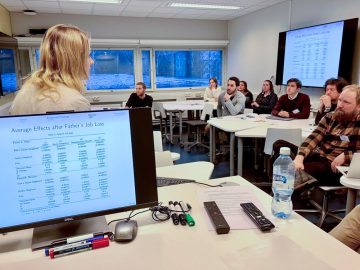 Scientific Seminars will take a next step in May 2024.
Scientific Seminars will take a next step in May 2024.
– The topic of this year’s seminar is Digitalization, Social Inequality and Behavioral Change. Call for papers is open until January 31st, 2024, Research Coordinator Laura Jaakonaho tells.
Keynote speakers has already been chosen: Vili Lehdonvirta, University of Oxford and Eva Serlachius, Karolinska Institutet. There will be open science related presentations for the whole audience.
The event brings together researchers from several countries and disciplines, and thus offers an excellent opportunity for scientists and professionals to familiarize themselves with research in the field, expand networks, deepen their knowledge and create new opportunities for cooperation.
>> Read more about INVEST Conference: Digitalization, social inequality and behavioural change

